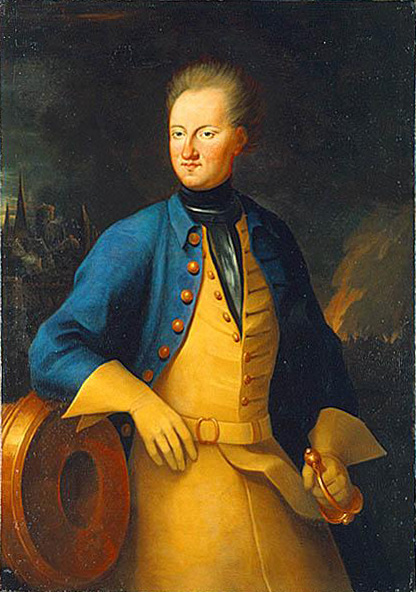Charles XII of Sweden
Charles XII, born on 17 June 1682, was the son of King Charles XI and Ulrika Eleonora the Elder. At the age of 15, he ascended to the throne and ruled as the king of Sweden from 1697 until 1718. His reign was dominated by the Great Northern War, which lasted from 1700 to 1721 and saw Sweden fighting against a coalition of Russia, Denmark-Norway, and Saxony-Poland-Lithuania.
Before Charles XII's accession to the throne, his father Charles XI had ruled the Swedish Empire from 1660 until his death from cancer in 1697. After his death, Sweden was governed by a five-man regency, all of whom had been trained by Charles XI. However, the senior nobility, who had opposed the extension of royal absolutism, made Charles an offer of full power in November 1697 and granted him his majority. The high nobility likely assumed that they could control a 15-year-old boy more easily than five adult regents, but they were wrong.
Despite his young age, Charles XII proved to be a wise and capable leader. He had accompanied his father on official business and was well-versed in the world of politics. In addition to his political acumen, he was also intellectually gifted. He was fluent in German and Latin and had an impressive knowledge of philosophy, art, maths, and architecture.
Under Charles XII's leadership, Sweden achieved some significant military victories in the early years of the Great Northern War. However, the tide of the war eventually turned against Sweden, and Charles XII's stubborn refusal to negotiate a peace settlement led to Sweden's eventual defeat. Despite this, Charles XII remains a fascinating figure in Swedish history, renowned for his military prowess and intellectual achievements.

Charles XII followed in his father's footsteps and continued the policy of absolutism in Sweden. However, despite this, he was well-liked by the Swedish people, who warmed to him, making popular rebellion unlikely. Charles was an abstemious and industrious worker as well as a brave leader, sometimes to the point of folly. He believed that the king needed to encourage his men by setting a brave example, and he would lead his men into battle.
Unfortunately, this brave behavior may have led to his death at Fredrikshald at the age of 36. Although many have argued that he was murdered by affiliates of his sister's brother, Fredrik, who had a motive, there is still some debate around the circumstances of his death. With no children of his own, Charles' sister Ulrika Eleonora became Queen when he died, and Fredrik became King Fredrik I.
By 1700, Sweden's power had declined since the days of Gustavus Adolphus, and the nation had only flourished when its Baltic neighbors were in an unorganized state. Once states like Russia and Brandenburg became more internally stable, Sweden's dominant position in Northern Europe would be under threat. During his reign, Charles XII had to compete against Peter the Great of Russia and Brandenburg-Prussia's increasing dominance. To maintain Sweden's status around the Baltic Sea, Charles fought against an anti-Swedish coalition led by Peter the Great of Russia, Augustus II the Strong of Saxony-Poland-Lithuania, and Frederick IV of Denmark-Norway in the Great Northern War. Unfortunately, Sweden was ultimately defeated in 1721.
Charles remained a bachelor and declared that he was "married to the army." His death in 1718 ushered in a new era for Sweden. The civil service had governed Sweden during Charles' absences, and they declared new laws in 1719 to establish parliamentary government in Sweden. The new "Age of Liberty" replaced royal absolutism in Sweden, and the country took a significant step towards democracy.
MLA Citation/Reference
"Charles XII of Sweden". HistoryLearning.com. 2025. Web.
